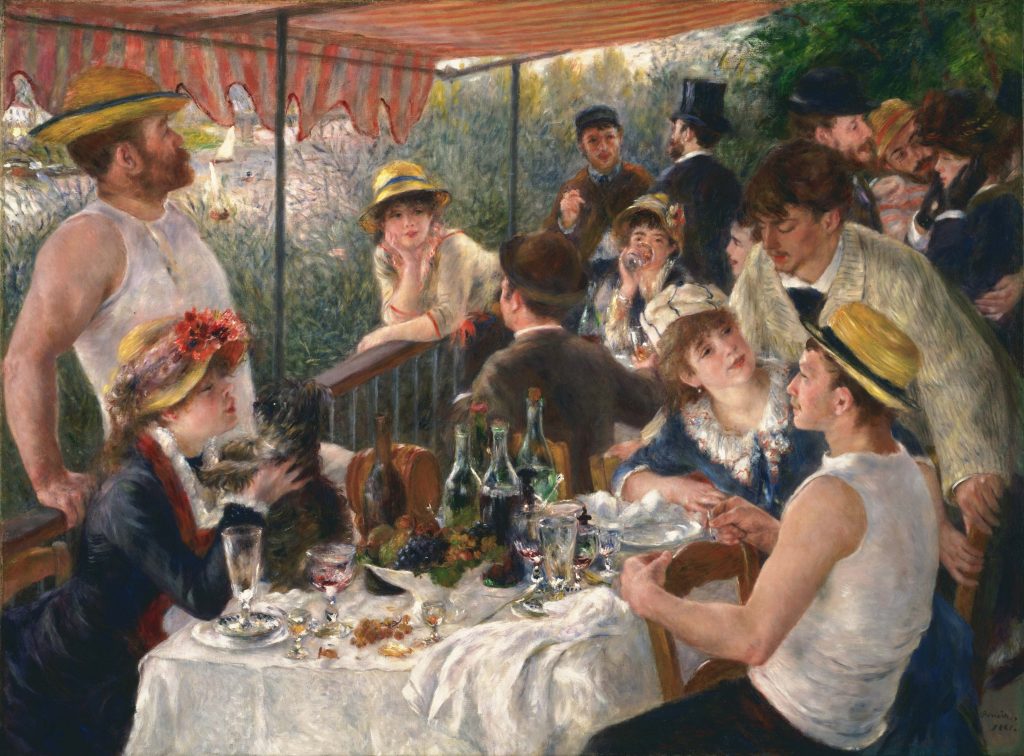Some may be surprised to hear this position. After all, I harangued writers for over-relying on the small-talk topic of “What have you been reading?” Hopefully, this contradiction goes away by the end of my defense.
Defining the terms, small talk is anything that is light, casual conversation about unimportant and inoffensive topics. No politics, no religion, and no bad news, unless it is bad news about the weather. I think we can all agree about that. I think we can also all agree that small talk as it fits in this definition is a neutral term. Yet we hear the word and we react negatively. We all think small talk is the pits.
The intention behind small talk is ill-defined, or at least rarely considered. We have accepted that small talk is the conversational equivalent of killing time, and as a result, in groups where small talk occurs, the participants are unengaged, uncompelled, and uninterested in each other. Yet we also hold out hope for the moment that small talk transforms into large talk. We talk about the weather so that, having set a foundation of friendliness, we might navigate the conversation into heavier underbrush. Each thread of meaningless conversation binds into a web that will support the weight of a bigger topic.
And why not? I have conversations because I want to connect and engage with other people. If I just wanted to hear myself talk, I would talk to myself (which I do). So if we reexamine the motives of small talk and strip away its stigma, we can take back control of what we want our small talk to achieve.
*
Don’t we all know a person who can talk to anybody? Policemen, next-door neighbors, antisocial cousins, manicurists all fall into easy conversation with this friendly chatterbox. This person is someone who has mastered the art of small talk and reconfigured its intentions. Instead of killing time, they are taking a shortcut to connection (and not a false shortcut either) and establishing a foundation from fewer interactions, because, to reuse the analogy above, they are using stronger threads. Not all small talk is equal.
I really believe small talk can be a more productive exercise, an understanding of the limitations that keep strangers and acquaintances from sharing more than the shallow parts of their personality and experience. Even now, if we study the questions we use to small talk to each other, we can see that we are still trying to connect and engage. See if this interaction sounds familiar:
Joe: Where are you from?
Jane: Bethesda, Maryland.
Joe: That’s crazy! I have so many friends from that area. Do you know Sue?
Jane: No.
Joe: Betty?
Jane: No.
Joe: Tommy? Patrick? Rachel?
Jane: Rachel McCormick?
Joe: Yes! She’s my cousin. Isn’t she great?
Jane: I went to high school with her. She’s so great.
Joe: Do you know…
And so on.
This is a clear reach for common ground, done in the laziest way, and, more often than not fails to excite any true connection. Yet we continually trap each other into these conversations, spinning our wheels even as we baldly demand that we move forward already. This is what we have reduced small talk to, a dead end. Then, we blame the victim.
*
Small talk at its best is fun, vibrant, exciting in a safe way, and above all, inclusive. Anyone should be able to join in the group, and at the end, everyone learns something new about the people in the conversation, a fact or opinion that can, in the near future, lead to another conversation. Small talk, while in no way the key into a person’s soul, is still an extra inch of space to squeeze through one day, a chink in the wall that separates us from one another.
For myself, my favorite small talk topic is to ask what everyone’s Myers-Briggs personality types are. (Or their enneagram. Or astrological sign.) Most people took the Myers-Briggs in high school, and then again online a few years after, while bored at work. Those who haven’t have at least heard about the test, or of personality tests in general. So everyone can join in. Best of all, everyone, shielded by the illusion of talking about a “scientific test” feels safer about talking about themselves, about what they like and don’t like about their personalities, and about the experiences and memories that lead them to agree or disagree with their assigned type. Few are disengaged when the topic is them.
So this is a call to stop being lazy. Or rather, to stop blaming small talk for our own laziness, our own reluctance at times to engage, and our desire, in certain moments, to kill time. If we, on occasion, choose to lean on small talk topics that we know will make for boring conversation, then we have to take full responsibility, and acknowledge that we are not using small talk to the fullest of its ability.
To mangle the last lines from the sci-fi thriller Soylent Green: “Small talk is people! You’ve gotta tell them! You’ve gotta tell them!”
Small talk is people.
Image: Renoir, Pierre-Auguste. “Luncheon of the Boating Party.” 1880-81. Oil on canvas. The Phillips Collection, Washington, D.C.




